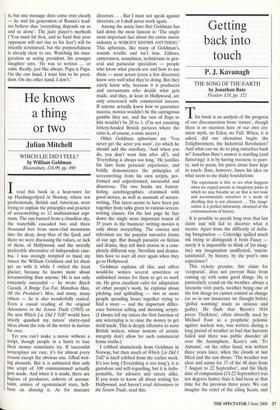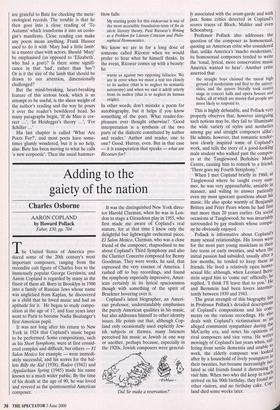Getting back into touch
P. J. Kavanagh
THE SONG OF THE EARTH by Jonathan Bate Picador, £18, pp. 322 This book is an analysis of the progress of our disconnection from `nature', though there is no mention here of our own cre- ation myth, no Eden, no Fall. When, it is asked, did our alienation begin: the Enlightenment, the Industrial Revolution? And what can we do to plug ourselves back in? Jonathan Bate's answer is startling (and flattering): it is by having recourse to poet- ry, and to poets, for poets alone have kept in touch. Bate, however, bases his idea on what seem to me shaky foundations: The experiment is this: to see what happens when we regard poems as imaginary parks in which we may breathe an air that is not toxic and accommodate ourselves to a mode of dwelling that is not alienated ... The imagi- nation is a perfect laboratory, cleansed of the contaminations of history.
It is possible to puzzle long over that last claim and still fail to discover what it means. Apart from the difficulty of defin- ing Imagination — Coleridge spilled much ink trying to distinguish it from Fancy surely it is impossible to think of (to imag- ine) any imagination unaffected, `uncon- taminated', by history, by the poet's own experience?
This rickety premise, this claim for `ecopoesis', does not prevent Bate from coming up with some good things. He is particularly sound on the weather, always a favourite with poets, weather being one of the few things we cannot control or change (or so in our innocence we thought before `global warming' made us anxious and guilty). He finds that Byron's 1816 poem `Darkness', often absurdly used by Michael Foot as a prophetic polemic against nuclear war, was written during a long period of weather so bad that harvests failed and there was public disorder all over the hemisphere. Keats's ode `To Autumn', on the other hand, was written three years later, when the clouds at last lifted and the sun shone. `The weather was clear and sunny for 37 of the 48 days from 7 August to 22 September', and the likely date of composition (15-22 September) was ten degrees hotter than it had been at that time for the previous three years. We can imagine the relief of the ailing Keats, and are grateful to Bate for checking the mete- orological records. The trouble is that he then goes into a close reading of 'To Autumn' which transforms it into an ecolo- gist's manifesto. Close reading can make any poem mean anything. Frank Hauser used to do it with 'Mary had a little lamb' in a master class with actors. Should 'Mary' be emphasised (as opposed to 'Elizabeth', who had a goat)? Is there some signifi- cance in that 'had', rather than 'has'? Or is it the size of the lamb that should be drawn to our attention, dimensionally challenged?
But the mind-breaking, heart-breaking feature of this serious book, which is an attempt to be useful, is the sheer weight of the author's reading and the way he pours it over the reader's bewildered head. So many paragraphs begin, 'If de Man is cor- rect ...', 'In Heidegger's theory 'For Schiller ...'
His last chapter is called 'What Are Poets For?', and most poets have some- times glumly wondered, but it is no help, alas. Bate has been moving to what he calls `a new ecopoetic'. Then the usual hammer- blow falls: My starting point for this endeavour is one of the most accessible foundation-texts of fin de siecle literary theory, Paul Ricoeur's Writing as a Problem for Literary Criticism and Philo- sophical Hermeneutics.
We know we are in for a long dose of someone called Ricoeur when we would prefer to hear what he himself thinks. In the event, Ricoeur comes up with a beauty: he
warns us against two opposing fallacies. We are in error when we moor a text too closely to its author (that is to neglect its semantic autonomy) and when we cast it adrift utterly from its author (that is to neglect its human origin).
In other words, don't mistake a poem for autobiography, but it helps if you know something of the poet. What reader-for- pleasure ever thought otherwise? 'Good interpretation is a synthesis of the two parts of the dialectic constituted by author and reader.' Author and reader, one to one? Good. Hurray, even. But in that case — it is exasperation that speaks — what are Ricoeurs for?






































































 Previous page
Previous page